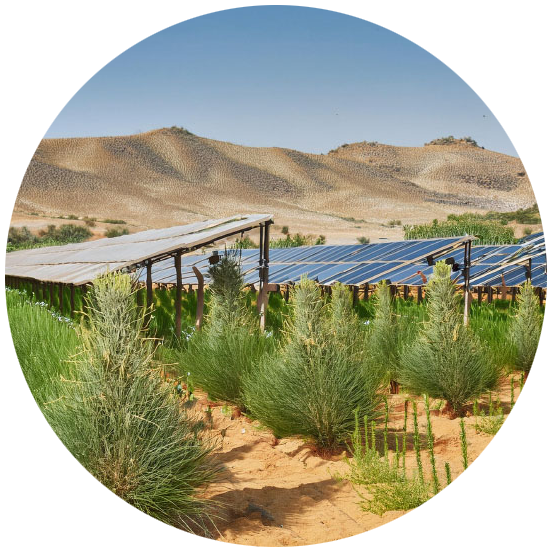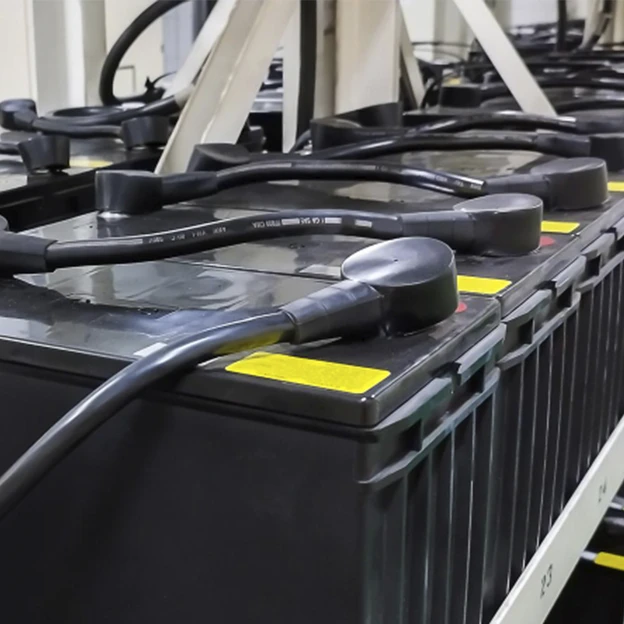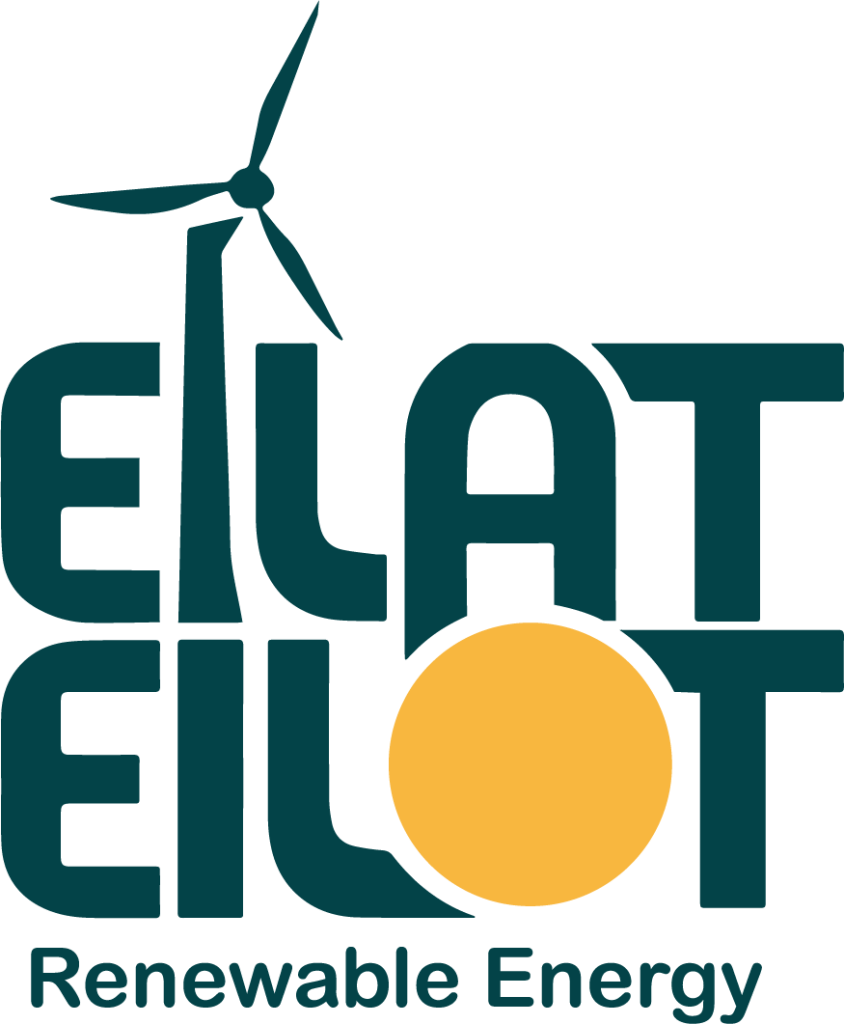Renewable Energy R&D
The Eilat-Eilot region is a hub for developing and implementing clean-tech and clean energy and serving as a showcase for cutting edge innovations.

Agrivoltaic Testing
These days, the Ardom Agrovoltaic Corporation is being established in the Arava for the promotion of agrovoltaic agriculture in the Arava that will produce food and solar energy at the same time. Partners for the project: Ardom Corporation, the kibbutzim in the Southern Arava and the energy company Doral.
Today there is a pilot of an agrivoltaic facility in the Arava funded by the JNF Joint Institute for Global Food, Water and Energy Security which combines renewable energy production from solar panels and field crops. The installed power of about 8.5 kilowatts per 100 square meters. In the pilot, tomatoes, onions, wheat and corn are grown according to the seasons and in fact they are checking whether it is possible to use the land twice – to produce electricity and grow food.

Green Hydrogen
Some of the biggest challenges in clean energy are in the transportation of solar / wind energy from the production areas to the consumption areas, long-term storage and clean fuel for transportation. Green hydrogen can provide the solution to these issues.
We at Eilat-Eilot have taken up the gauntlet and are promoting pilots to produce green hydrogen for various uses: fuelling electric vehicles, fuelling heavy vehicles with hydrogen, producing heat for industry, and transporting clean energy to power plants. In the first phase, a pilot will be established by Doral company together with Israeli startup H2PRO to produce 400 kilowatts of hydrogen and in the second phase 30 megawatts that will produce 500 tons of green hydrogen per year for various uses.
Compressed Air Energy Storage
Installed in Kibbutz Yahel is a first of its kind in the world, compressed air energy storage facility. An air battery that uses air and water to store energy in a cheap and safe way and with 81% efficiency.
The batteries are large containers made of a unique polymer, which significantly lowers production and maintenance costs. The containers are stored underground in iron pipes with a layer of concrete above them.
The Yahel site consist of a 1MW project in 4 tanks of 250KW per hour each, and two more underground operating tanks. Each container has 123 kb. The air pressure in the tanks reaches up to 40 bar (up to 60 bar is possible).


Thermal Battery for Energy Storage
Establishing an alternative to energy storage technology in lithium-ion batteries in collaboration with several parties: KKL-Junk, Ratenergy and Eilat-Eylot Renewable Energy. Ratenergy’s innovative technological solution is intended to be an alternative to lithium-ion batteries. The pilot includes two components: a thermal storage battery using sodium-sulfide technology , and a solar collector with a heat exchanger. The principle is to store solar energy during the day and use it at night. 80% cycle efficiency is improved by using thermo-solar energy that compensates for the energy losses generated during the operation, thus increasing the efficiency and economic viability Extremes without a decrease in efficiency emphasizes the system’s durability and environmental compatibility, while sodium-sulfide is a common mineral, long-lasting and easily recyclable.

Off Grid Village
Eilat-Ilot established the Center for Off-grid Technologies, located in Kibbutz Ketura in the Southern Arava. The center was founded in order to serve as a platform for Israeli technology companies that develop technologies relevant to the disconnected world, where they can try the technology under conditions that simulate real conditions and, above all, expose it to relevant parties such as end customers, aid organizations and funding bodies. The place is also a training center for the use of technologies and for the creation of business models and methodologies for introducing technologies and services to the disconnected world.
Past project
Validation Center
In 2011 we established an experimental field and a verification center for renewable energies.
The site, located in Kibbutz Ketura, is an essential station for project development, in that it provides all the operational and managerial needs of the projects.
The experimental field and the verification center are a platform for accelerating projects in order to bring them from the theoretical planning and research phase to the production and export phase, in desert climatic conditions in preparation for the field.


Past project
Off-Grid Water Desalination
The goal of the Innovation Committee, funded by the Kasser Joint Institute for Food, Water and Energy Security, is to serve as a catalyst for innovation and to provide solutions for hyper-arid farming, particularly in the developing world. We are testing technologies complementary to Agrivoltaics at the Southern Arava R&D facility and the most suitable technology according to the challenges and price will be moved forward with intention to launch in Africa.
Currently being tested and developed is a small, fully automated, water desalination technology provided by EZPack, a company specialized in water storage and distribution. The water desalination technology, EZPuro, is powered using photovoltaics modules that are installed in the nearby Agrivoltaics facility. The relatively salty water (pumped from the aquafer) is desalinated by the EZPuro technology and that product is then used to irrigate the crops. The EZPuro technology is a robust technology that is planned to be the heart of the water production facility at our off-grid technology validation and innovation facility.

Past project
Solar Panel Cleaning Robotics
Ecopia develops advanced robotic solutions for cleaning solar panels in large solar installations completely automatically and without the use of water, to minimize loss of efficiency, caused by dust and sandstorms in desert areas.
Ecopia held their pre-market pilot in Israel’s first solar field in Kibbutz Ketura in the Arava, back in 2015. Since the company has began its commercial stage and their products are available for purchase.
Past project
Aora's Thermo-Solar Tower
Aora company thermo-solar tower was built in 2011 in the southern area of Kibbutz Samar in the Arava, and was based on research from Weizmann Institute of Science. This innovative facility towered to 30 meter high, with 30 heliostat mirrors on the surrounding ground. The mirrors directed sun rays to the head of the tower warming up the temperature to 1000 Celsius and up, operating a gas turbine generating 100KW electricity and 170KW heat.
This groundbreaking pilot was the first thermo-solar power plant in Israel and was connected to the national grid. Eventually PV prices dropped significantly, which turned PV to the most common solar technology used today. The tower suffered a fire back in 2017 and has been retired since.

Local Renewable Energy Research
With our encouragement and support, clean energy departments have been created in all regional organizations that deal with research, development and study of renewable energy.

Dead-Sea & Arava Science Center
The Dead Sea and Arava Science Center operates throughout Israel’s southern region of the Dead Sea and Arava, up to the city of Eilat, an area that covers 20% of the territory of the State of Israel. There are four local authorities in this area: Megilot, Tamar, Arava Tichona and the Eilot region.
Arava Institute
The Arava Institute promotes research and environmental-applied projects in collaboration with researchers and organizations in the Palestinian Authority and Jordan.
The center deals with a variety of topics: agriculture in extreme climates, herbs, renewable energy, water resource management, sewage treatment, water desalination, mapping the biological diversity in the area, protection of natural resources and more.
The Center for Development at the Institute translates the innovative research into practical technological solutions.

